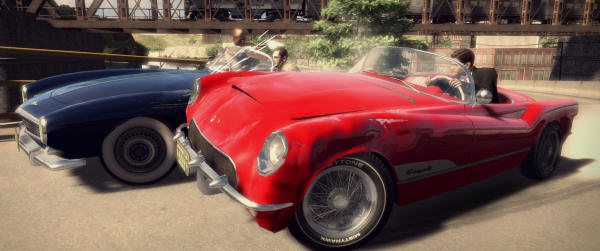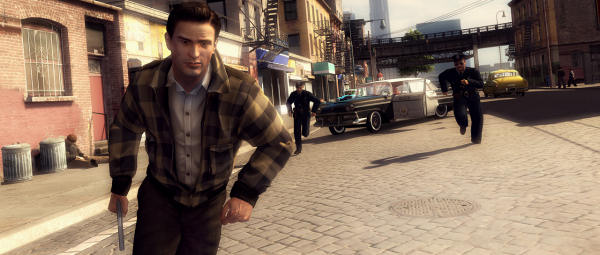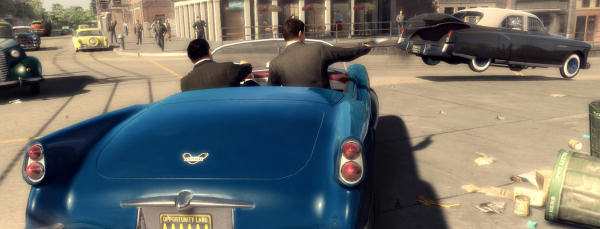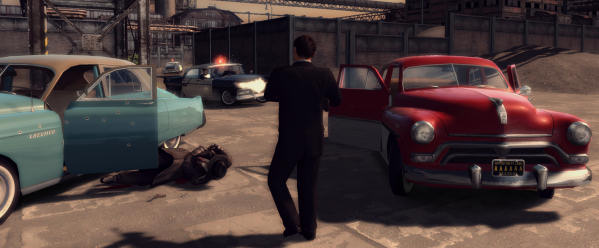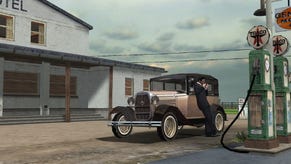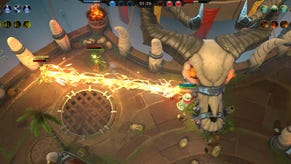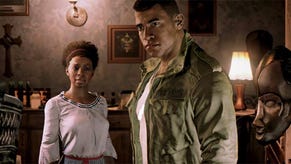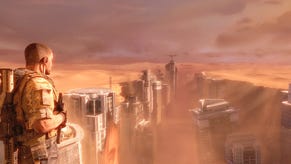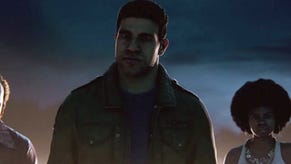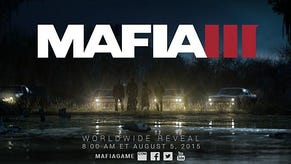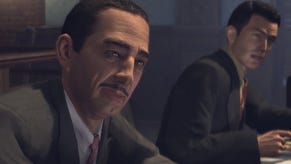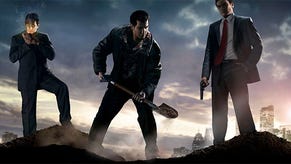RPS Interview: Mafia II
During my travels to deepest Czech Republic (look countries, can you pick names that work in grammatical sentences please?) I gathered you all the Mafia II information I could carry in my arms, providing what might well be the most detailed preview ever in the history of the universe. But I still wanted more. More! So I got hold of associate producer Alex Cox and had him answer all sorts of questions about the game. We find out about the choice behind the setting, the logic of a narrative game in a sandbox world, the background behind new player character Vito and why AI will play such an important role in the game. Read on.
RPS: To what do you ascribe Mafia’s long-lasting appeal, seven years since its original release? Why was the game so special?
Alex Cox: Mafia was (and still is) a really distinctive game. It wasn’t afraid to wear its heart on its sleeve, and people engaged with that. The mature narrative approach was a bold statement, it was a balls-out homage to mafia movies and didn’t cop out with cheesy clichés or happy endings – it portrayed life in the mob as something with highs, but ultimately lows. The characters were plausible, the car handling was authentically 1930s, surviving shootouts was tough. The approach to the sandbox as a beautiful and realistic backdrop to the story, rather than making it a story-breaking playground – again that shows some conviction. Having a police force that ticked you off for speeding. These are all things that conventional thinking about this game genre tells you to change, but the team stuck to their guns and produced something that’s very unique. Maybe it had its flaws, but the overall experience was very human. I think that’s why people still have Mafia in their hearts, it was genuinely involving in a way that most games haven’t achieved.
RPS: When returning to the game to develop the sequel, what other directions did you consider taking the story? Were there ever plans to reuse the original cast, perhaps filling in gaps in the timeline? Or plans to go even earlier?
AC: Well, we could have gone a little earlier, but in reality the American Mafia doesn’t go back too much further in history, as you get back toward the start of the century was when these guys were first arriving in the US – maybe there could be a story there, Gangs of New York style? I suppose the problem here would be that we’d start driving round in carts… No, [game author] Dan Vavra’s intention was always to move the story forward and explore new eras, the 40s and the 50s. The story in Mafia II is a new chapter, set in the same universe as the original game, returning to the same themes, but its not a direct follow-on. The fate of the original characters was pretty… terminal… lets say, so there wasn’t much choice. In fact we don’t pick up too far from the end of Mafia which ended in the late 1930s, we pick up Mafia II in early 1945.
RPS: Mafia appeared very early on in the world of open-city games. Are you surprised more developers haven’t attempted to create more narrative-driven games in this genre?
AC: Well, maybe not so much. One of the challenges of the genre is that on a philosophical level the ‘sandbox’ is about emergent gameplay. It's actually very difficult to create a dramatic, compelling narrative that melds naturally with the freedom of a sandbox world. Films are directed - you would get a far diluted narrative experience if the viewer was encouraged to pause the film regularly, leave the cinema for a while, maybe go and watch some other films, then unpause to continue. Mafia is about constructing a very consistent experience, one where all the various sandbox elements have been designed to support the narrative. It’s totally understandable that most open-world developers have chosen to take the mini-game, mini-quest approach – it emphasises the sandbox playground and that’s fun and no bad thing. Mafia II has a super-detailed sandbox, don’t get me wrong, but we are using it in a different way, where we have rules that encourage the player to behave realistically, to encourage the player to act ‘mafia’, so that we can walk from the street and engage with other gangsters in a plausible way that doesn’t break the narrative. Not so plausible if we allowed Vito to visit the Don wearing a diaper, sporting a pink pimp hat, wielding a bazooka. If you want the diaper pimp bazooka game, or you want to focus on other non-linear gameplay elements then you naturally have to compromise on the strength of your narrative to some degree.
RPS: Have you felt pressure to develop other aspects of the open world genre – side quests, bonus missions (say, stealing an ambulance and triggering an ambulance minigame), giant helicopter mayhem rocket launcher pedestrian murdering fests?
AC: That sort of carnage can be a lot of fun, it certainly is in many other notable sandbox games, but it has to resonate with the narrative. And Vito running around with crazy weapons, leaving a trail of burning wreckage behind him just doesn't fit the story or the world. As you know we have a police presence in the city, and you can of course run around shooting vehicles and so forth, but in Empire Bay, the punishment fits the crime. If you break the law, you can expect an appropriate response from the police - from a speeding ticket to shoot-on-sight. We don’t want to discourage the player from making choices, but we're presenting a believable reality that offers consequences commensurate with your actions. Again this feeds into the reality thing – Mafia guys are part of a secret society. They don’t generally wake up in the morning and loon around a city murdering hundreds of people. We aren’t going to encourage that – of course the player is free to do this, but you are going to have to face the consequences…
RPS: You’ve said that when you wanted to start making Mafia II, the technology didn’t exist to achieve your goals. So you made the Illusion engine in response. Can you tell us what the Illusion engine does that meets the needs you had?
AC: To give you a topline view, it handles all the things we need it to handle, and it needs to handle a lot. Multiple civilians, vehicles, intelligent pathing routines and detailed, period-authentic architecture, seamless streaming between the city, interiors and cutscenes. What people are finding surprising is just how much detail the Illusion Engine is capable of. Not just incidental detail, with civilians going about their everyday lives around you, but also in terms of graphical fidelity. Empire Bay is a stunningly attractive environment – we definitely expect to set the same visual benchmark with Mafia II that Mafia did when it released, but this time we’ll be doing that on console as well as PC. Building the Illusion Engine was a labour of love – but now 2K Czech are armed with the tool they need to deliver Mafia II exactly how they visualise it.
RPS: Could you tell us about the process of creating a primarily English language game, set in America, by a Czech development team?
AC: What can I say, it's been a long journey! Our writer, Daniel Vavra, wrote the story and script for the original Mafia, so you'll probably be familiar with his past work. He's a lifelong fan of mafia movies, he has a lot of familiarity with the culture, and he has a really deep understanding of mafia history and traditions. Dan is Czech, so the original script was written in Czech, which was then translated into English. Then the script goes into what we call ‘Americanisation’ – we have guys based in the US who review the script and add some cultural polish to the language. One of the key guys on this was Jack Scalici, he’s the Director of Production at 2K (so he records the VO amongst other things) and he’s a Italian American, from New York. This is a serendipitous alignment of the heavens really; not only has Jack really brought the final level of cultural polish to the dialogue, but also he knows every character inside and out when he casts the actors and records their lines. For our narrative experience to be the quality it is, we needed the script and VO to have that amount of love poured on it. And it works, the performances on screen make the characters so human and so plausible that you just get sucked in. The final step is then to translate the entire script to numerous other languages, so that players around the globe can enjoy the experience in the most relevant way to them. Of course Dan’s original Czech dialogue will appear in the Czech version, so we won’t lose anything in translation.
RPS: The game’s new main character is Vito, along with his childhood best friend, Joe. Could you tell us a bit about them?
AC: Joe and Vito are both the children of Sicilian immigrants, and grew up in Little Italy, which was pretty much a slum in Empire Bay at that time. They're lifelong buddies, Joe was a meathead kid who liked to throw his weight around and took Vito under his protection. As boys, they saw the success of the wise-guys and the made-men, and also saw the alternative first hand: a breadline-life of drudgery as a poor immigrant. So they take their first steps into the world of organised crime.
Vito is more the strong and silent type, he’s driven by not wanting to repeat the mistakes his father made, who he saw as a loser, a pathetic drone who drank his life away and left the family in debt. Vito wants to be somebody and to ensure his family never tastes poverty again. Joe on the other hand, he’s a true wiseguy. He was born for the loud Mafioso lifestyle, broads, booze, bars and casual violence. He’s an act-first-think-later kind of bloke, he’s the driving force behind Vito’s entry into the mob. He’s a fun character to be around.
RPS: A great deal of effort is going into the cutscenes, with your new tools to create them, multiple recording sessions, and acres of writing. Do you worry about the balance of how often you take control away from the player? How do you get that balance right?
AC: Balance is really not something we're worried about. Our cutscenes are very high quality, and they offer a level of detailed storytelling that is unusual for most games. We tell a lot of the story in gameplay, for example we are creating atmospheric ‘joy walks’ where you get these beautifully scripted events happening around you in the city and during missions – again the level of detail we are going into here is massively cool for a sandbox game. The cutscenes are there for those moments when cinematic presentation is required to make the most impact. The power of a cut, close-up, crash zoom – we just have to use these devices sometimes and that’s where the cutscenes come in. Plus, there's a lot of city to explore (Empire Bay is twice the size of Lost Heaven) and there are plenty of side-missions that feed into and out of the narrative and give more back-story and character exposition for those players that want to find out more - cutscenes are just one way we are telling the story.
RPS: During recording dialogue, you had actors together in the studio, recording conversations. Did it get good results?
AC: When you're dealing with a script of this level of intricacy, every character needs to be absolutely unique and believable. We believe in giving our actors the space to really become their characters. In our eyes, it's crucial that the script is vocalised in the most natural way, and in practice this means having the actors working together in the studio. We feel this makes the dialogue hang together in the best way, and the actors to really become the characters they're playing. If the guys are actually playing out dialogue in concert rather than in isolation, those lines are delivered with true emotion. You get subtlety and nuance, and the characters really spark off each other while remaining distinguished.
RPS: You have eight people working solely on the AI. What are you hoping your characters, NPCs and so on will do that no other game has managed?
AC: In the final count, it’s all about immersing the player in a believable reality, that’s really the ultimate aim. Every NPC they encounter has to meet the player’s expectations in terms of how they react to the player. Those reactions have to be relevant to the player’s experience, and plug into the reality they’re based in. For example, if you hassle an NPC, he may react with a little violence. But another NPC type, and we have a huge number of them, may back off and avoid violence. Likewise, the forces in the game, rival mobsters or the police for example, need a different set of reaction criteria and reactions. In a city full of personalities, you need a huge spectrum of relevant responses. Then you’ve got NPCs going about their daily lives, shining shoes, stopping at a park bench for a cigarette or to read the paper, or heading into a diner for lunch... when you add it all up, that’s a really huge number of branching routines. And I’ll bring it back to our primary aim: immersing the player in our gameworld so the story can shine. We feel that the city offers an unprecedented level of immersion.
RPS: Finally, clearly authenticity is a key part of the game, with locations recreated throughout to reflect the fashions of the time, appropriate music on the radio, and enormous numbers of background details. So, erm, how come in the mission we were shown Vito hums the Mission Impossible theme in 1951?
AC: Good spot! Whether or not that makes the final cut is undecided yet. So just for the benefit of your readers who haven’t seen the scene, we have this mission where Joe and Vito are rigging a bomb while disguised as cleaners in a rival boss’ boardroom. I’ll just say that we look everywhere for our inspiration. And yes, the focus is obviously the whole mafia genre and the rich cinema history it brings, we like to tie in relevant cultural hooks too. We like to have fun with what we do, but we’re always driven by relevance. If necessary, for a nice joke, to support the gameplay or to fulfil player’s expectations of the era, we will take artistic license with some of the more trivial facts. The tune you mention is a cultural checkpoint that everyone gets, it’s an in-joke – and this IS a game after all...
Big old thanks to Alex Cox and 2K Czech. Mafia II is due out in the Autumn.


